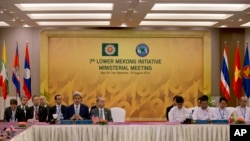In late July, Secretary of State John Kerry and the foreign ministers of Cambodia, Laos, Thailand, Myanmar, and Vietnam met in Vientiane, Laos, for the 9th Lower Mekong Initiative Ministerial Meeting. The Lower Mekong Initiative (LMI) was launched in 2009 to narrow the development gap between the five Lower Mekong Countries.
The Initiative focuses on six areas: agriculture and food security, connectivity, education, energy security, environment and water, and health, as well as issues related to improving gender equality.
As Secretary Kerry has said, “At the heart of the Lower Mekong Initiative is one concept: sustainability.” This is particularly important today, as the entire region suffers through the worst drought in nearly a century. According to the U.S. Geologic Survey’s chief scientist for climate and land use change, the Mekong region is among the most seriously imperiled regions on the planet. It will almost certainly see more intense dry seasons, wetter monsoons, floods, storms and rising sea levels.
We need to heed these warnings and act accordingly, Secretary Kerry said. “Since we began this project, we have explored ways to cooperate, to share information, and address the full range of water, energy, and food security challenges that we face.”
Responding to these continued challenges, this year the LMI Ministers meeting in Vientiane formally launched a “Sustainable Infrastructure Partnership” to improve regional infrastructure planning and performance while mitigating environmental impacts.
“The Mekong River is the economic lifeblood of the entire region, and it helps to enrich lives, it pays the bills, fills the stomachs of some 70 million people. It’s also a priceless center of biodiversity,” Secretary Kerry said. “We have learned that, wherever we have a fragile ecosystem supporting a regional economy, you need a strategy that nurtures the health of both, and you require all of the regional components of that ecosystem to share in responsibility.”














